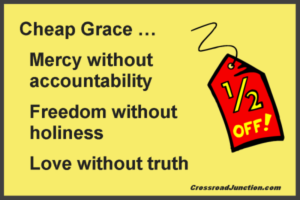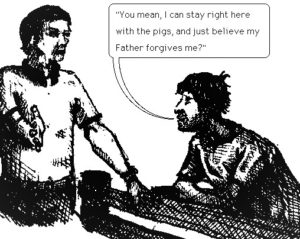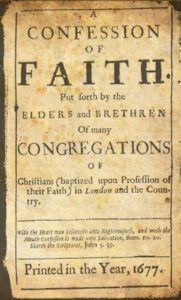The least pleasant part of a pastor’s job is Titus 1:9, “to refute those who contradict”. But when I think of all those who have loved me enough to warn me, I’m deeply thankful. I shudder to think where I’d be if they had not done so (Jam 5:19-20; Prov. 27:5-6). Protecting others from error is part of Jesus’ golden rule, a labour of love, and the work of a true shepherd (Matt. 7:12; 1 Cor. 13:6; Php. 1:9-11; Acts 20:17-38). A member of our church recently asked me about a Christian book making the rounds. It’s by Marci Preheim entitled, Grace is Free: One Woman’s Journey From Fundamentalism to Failure to Faith. As I read it, there was much that I agreed with. Not for a moment would I defend any of the awful legalism and soul-killing, joy-stealing, pride-fuelling, church-splitting doctrines of some fundamentalists.[1] I share Preheim’s righteous anger against all the spiritual ruin caused by moralism, externalism, empty ritual and dead, willpower religion.
 Who doesn’t grieve any time we hear of hypocrisy causing God’s dear children to stumble, harming their faith, disillusioning their children, tempting them to be mad at the Church, suspicious of authority, and distrusting of God’s Word? The Lord reserves His strictest judgment for those spiritual leaders who wreak such havoc (Matt. 18:1-6; Matt. 23). I agree with Mrs. Preheim that we must wage a lifelong war against the Pharisee inside of us all. However, there is also a pagan inside of us all that requires constant combat. The ditches on both sides of the biblical road of sanctification are deep and deadly. They are legalism and license.[2] We never have the luxury of fighting one while ignoring the other.
Who doesn’t grieve any time we hear of hypocrisy causing God’s dear children to stumble, harming their faith, disillusioning their children, tempting them to be mad at the Church, suspicious of authority, and distrusting of God’s Word? The Lord reserves His strictest judgment for those spiritual leaders who wreak such havoc (Matt. 18:1-6; Matt. 23). I agree with Mrs. Preheim that we must wage a lifelong war against the Pharisee inside of us all. However, there is also a pagan inside of us all that requires constant combat. The ditches on both sides of the biblical road of sanctification are deep and deadly. They are legalism and license.[2] We never have the luxury of fighting one while ignoring the other.
In seeking to expose error, I believe Preheim overstates her case and falls into error herself. When we warn against “the leaven of the Pharisees”, we must ensure that we don’t embrace the leaven of the licentious. While reading this book, I could hear the echoes of other voices in the Church today that are also cheapening God’s grace, redefining Christian liberty and misleading many[3]. So I am compelled to write. Here are three reasons why I believe Grace is Free is a costly and harmful book: it is antinomian; it contains false dichotomies; it misinterprets Scripture.
Antinomianism
We can disagree with church history, but we cannot ignore it. Solomon tells us there is “nothing new under the sun” (Eccl. 1:9), so we should expect bad ideas to get recycled. Scripture tells us to be on the alert for Satan’s lies in every age (2 Cor. 11:3; Col. 2:8; 1 Pet. 5:8), and the past 2,000 years of church history tell the story of old errors that refuse to die. One of those is Antinomianism. Though this word was coined by Martin Luther, the error is as old as Eden, when Satan tempted Adam to turn “against God’s Law” (anti-nomos = against law). Antinomianism has been called the original heresy, the mother of all theological errors that have troubled God’s people. It says that God’s Law is not important, or necessary for sanctification, or for living the Christian life.[4]
Romans 6 warns against the subtle lie of antinomianism: “What shall we say then? Are we to continue in sin so that grace may increase? May it never be!” (vv. 1-2). Jude’s entire epistle is against antinomianism: “For certain persons have crept in unnoticed…ungodly persons who turn the grace of God into licentiousness” (v. 4). In today’s Church there is a new wave of those eager to celebrate God’s ‘extravagant, scandalous, lavish’ grace by minimising obedience.[5] They downplay deeds, behaviour and striving, at the expense of resting and abiding. They treat effort like a four-letter swear word.[6] It’s exactly what an indulgent, worldly Christianity has been wanting; it’s everything my flesh craves.
grace may increase? May it never be!” (vv. 1-2). Jude’s entire epistle is against antinomianism: “For certain persons have crept in unnoticed…ungodly persons who turn the grace of God into licentiousness” (v. 4). In today’s Church there is a new wave of those eager to celebrate God’s ‘extravagant, scandalous, lavish’ grace by minimising obedience.[5] They downplay deeds, behaviour and striving, at the expense of resting and abiding. They treat effort like a four-letter swear word.[6] It’s exactly what an indulgent, worldly Christianity has been wanting; it’s everything my flesh craves.
Preheim demonstrates that she has bought into this modern antinominaism when she writes, “Focusing on behaviour leads to external works and a neglect of the heart, which is where true godliness is or isn’t (p. 11).”[7] She is presuming that focusing on behaviour and focusing on the heart are mutually exclusive. But God focuses on our behaviour all the time in His Word. Grab a concordance or do a word search on “deeds” – it’s everywhere, from Genesis to Revelation (Gen. 32:10; Rev. 19:8; “deeds” found 159 times in ESV). Preheim repeatedly downplays Christian activity. She writes, “You won’t find many activity-based commands that can be written down on a to-do list and crossed off at the end of the day (p. 19).” I beg to differ. For example, there are 52 one-another commands in the Bible. Can a healthy Christian conscience not rejoice when, by God’s grace, he/she is faithful in obeying some of these specific commands for our church life together? (See Paul’s own detailed testimony of his obedience in Acts 20:17-35.)
Preheim criticises those who encourage the use of Scripture memory verse cards, lists of prayer requests, and rising
early in the morning (p. 17). She misinterprets Titus 2 to say it’s more about a Christian woman’s attitudes than actions (p. 25), when in fact the text plainly shows it is both. Indeed, God does want gospel-driven deeds done in faith, not in the flesh; but that will still be manifest in many specific, practical actions. Grace is Free states, “Believing we have [God’s] favour no matter how we perform in a given day is the hardest thing for us to do.” (p. 50). But she is failing to see the difference between justification and sanctification. True, our deeds cannot alter our justification before God; but in sanctification, our deeds do affect God’s love for us and our assurance of salvation. Jesus made this clear when He said, “He who has my commandments and keeps them is the one who loves Me: and he who loves me will be loved by My Father and I will love him and will disclose Myself to him”(John 14:21, repeated in 14:23 and John 15:1).
 This is a classic antinomian error.[8] In 1637 in New England, faithful church elders had to refute antinomians in their midst who were troubling Christ’s flock. This Antinomian Controversy was also known as the Free Grace Controversy. One of the popular ideas that was rightly denounced as biblically “unsafe” and unorthodox went like this, “If I be holy, I am never the better accepted by God; if I be unholy, I am never the worse.”[9] Is this not the same error that Preheim is promoting when she says there is no correlation between God’s favour and our actions as believers? God’s Word plainly states that His children are eager to please Him in every way (2 Cor. 5:9; 1 Pet. 1:17) and even to “strive together for the faith of the gospel” (Phil 1:27). But Preheim warns against the “striving mode” in the Christian life (p. 50). She writes: “No one (in my Christian circles anyway) would actually come out and say that people will lose their salvation if they don’t strive for excellence. But they insinuate that they will lose God’s favor—whatever that means. ‘We have to teach the young people to be pleasing to God,’ they say to me behind closed doors….”[10]
This is a classic antinomian error.[8] In 1637 in New England, faithful church elders had to refute antinomians in their midst who were troubling Christ’s flock. This Antinomian Controversy was also known as the Free Grace Controversy. One of the popular ideas that was rightly denounced as biblically “unsafe” and unorthodox went like this, “If I be holy, I am never the better accepted by God; if I be unholy, I am never the worse.”[9] Is this not the same error that Preheim is promoting when she says there is no correlation between God’s favour and our actions as believers? God’s Word plainly states that His children are eager to please Him in every way (2 Cor. 5:9; 1 Pet. 1:17) and even to “strive together for the faith of the gospel” (Phil 1:27). But Preheim warns against the “striving mode” in the Christian life (p. 50). She writes: “No one (in my Christian circles anyway) would actually come out and say that people will lose their salvation if they don’t strive for excellence. But they insinuate that they will lose God’s favor—whatever that means. ‘We have to teach the young people to be pleasing to God,’ they say to me behind closed doors….”[10]
Was the apostle Paul speaking behind closed doors when he said, “Work out your salvation with fear and trembling…” (Phil. 2:2)? Or when he prayed for the Colossians to be fully pleasing to God, bearing fruit in every good work (Col. 1:10)? God makes it clear what pleases Him (e.g., Prov. 6:16-19; Col. 1:10; Heb. 13:15-16) and we should beware of those who tell us to disregard that. Another of the slogans of the Free Grace crowd in 1637 was, “tell me not of…duties, but tell me of Christ.” Sounds a lot like Preheim, “Could it be that good works do not come from striving for excellence…but rather through abiding in faith in the good work Christ has done for us?”[11] Yet the Bible is filled with duties and striving that God requires of us (e.g., 1 Cor. 9:24-27; Php. 2:12-13; 3:12-14; Col. 1:29; 2:1; 4:12).
One consequence of this kind of antinomianism is that it redefines legalism. Christ and His Word boldly confront both salvation-legalism and sanctification-legalism – any notion of works-based salvation (Acts 15; Romans 3-4; Galatians), or any manmade applications of Scripture that are put on par with the Word of God (Matt. 15; Mark 7). Both of these errors have done untold damage. But Preheim adds an unbiblical, third kind of so-called legalism: those who strive for holiness and eagerly apply God’s Word in specific ways, and who sincerely encourage others to do the same. In the Christian church, the accusation of “legalist” is deserved at times; but it can also be a smokescreen for those wanting to flaunt their Christian liberties, live more worldly, and chafe at spiritual authorities in their life.
False Dichotomies
If the Deceiver can’t get us to reject the Bible, he’ll seek to make us half-Bible Christians instead of whole-Bible
Christians (Acts 20:27, we need “the whole counsel of God”). Since the Garden, Satan has always loved to use half-truths and unbiblical dilemmas to ensnare God’s people. That’s exactly what antinomianism does – pitting law against love, holiness against grace, effort against faith, doing against being. Preheim’s book contains dangerous false dichotomies. For example, instead of aiming to give a clear gospel presentation to your lost friend, you should just do life together and actually love them (pp. 43,45). But why not both, since Paul prayed for direct gospel opportunities (Col. 4:3-4; Eph. 6:19-20)?
Instead of trying to rise early to meet with God, we’re told to pursue true devotion (p. 51). Why not both (Ps. 1:2; 63:1)? Instead of warning another believer about worldly habits, we should let God change their desires (p. 53). Why not both, since God uses us as His instruments in one another’s lives (Jam. 5:19-20). Preheim writes, “The truth is that God is far more interested in our hearts and beliefs than he is in our activities (p. 19).” Why then does the Bible repeatedly tell us that God’s final judgment will be based on our deeds (Rom. 2:6; 2 Cor. 5:10; 1 Cor. 3:8; Ps. 62:12; Rev. 20:12; Prov. 24:12; Col. 3:25)?[12]
Twisting Scripture
Lastly and most seriously, I am concerned at how Preheim mishandles God’s holy Word in numerous places. Here are a few of
the more prominent examples. Her use of John 15 is foundational to her entire book. She writes, “All the commands in the New Testament can be reduced down to one: abide in Christ (p. 19).” But I ask: What gives Mrs. Preheim or any one the right to cram all of God’s commands into whichever one we like the most? The only One I know who has the right to summarise all of God’s commands is our Lord Himself, who did exactly that when He summed up all the Mosaic Law in two commandments (Matt. 22:37-39).
She then defines abiding as consisting of three things: devotion, desire and dependence. All of those are critical, as she rightly explains. But what about the need for active obedience? Jesus’ command to “abide” includes a very active, deliberate, decisive and ongoing effort to “remain, stay, dwell” in union with Christ. Plus, in this same chapter, Christ also shows our duty to let His Word abide in us, to keep God’s commandments,and to love one another sacrificially (Jn. 15:7,10,12,17). But instead of including this, Preheim redefines abiding with another false dichotomy: “…fruitfulness comes from believing more, not necessarily doing more. As we abide in Christ, fruit is naturally produced. In nature, branches do not strive to produce fruit…(p. 33).” Again, she takes aim against any “striving”.
 Her misuse of John 15 then leads to more error. Preheim quotes 2 Peter 1:3 about the wonderful sufficiency of Christ for the believer, followed by this, “What else could we possibly need to do but abide in him?” She totally ignores the fact that 2 Peter 1:5-11 then proceeds to give an entire list of eight godly virtues we must actively pursue! Preheim rightly uses Matthew 7 to warn against self-deception and trusting in our deeds to save us (p. 38). Yet she omits the fact that true faith is also seen by its deeds. Jesus says the one who “enters the kingdom of heaven” is the “one who does the will of My Father” (Matt. 7:21). We cannot escape the emphasis here on deeds and fruit – it’s the whole point of the passage. How do you tell the difference between a true and false prophet? By their deeds. As Jesus concludes this entire Sermon on the Mount, the contrast between the house built on rock versus sand comes down to this one difference: one hears Jesus’ words and “does them”, and one “does not do them” (Matt. 7:24-27).
Her misuse of John 15 then leads to more error. Preheim quotes 2 Peter 1:3 about the wonderful sufficiency of Christ for the believer, followed by this, “What else could we possibly need to do but abide in him?” She totally ignores the fact that 2 Peter 1:5-11 then proceeds to give an entire list of eight godly virtues we must actively pursue! Preheim rightly uses Matthew 7 to warn against self-deception and trusting in our deeds to save us (p. 38). Yet she omits the fact that true faith is also seen by its deeds. Jesus says the one who “enters the kingdom of heaven” is the “one who does the will of My Father” (Matt. 7:21). We cannot escape the emphasis here on deeds and fruit – it’s the whole point of the passage. How do you tell the difference between a true and false prophet? By their deeds. As Jesus concludes this entire Sermon on the Mount, the contrast between the house built on rock versus sand comes down to this one difference: one hears Jesus’ words and “does them”, and one “does not do them” (Matt. 7:24-27).
True, any of these obedient deeds can be counterfeited, done legalistically, by works-righteousness and not by grace through faith. But still, Jesus teaches that the main, outward difference between the true and false convert is their good or bad fruits. We must beware of taking a text given to warn against false prophets and turning it into a pretext against earnest Christians striving for holiness. That’s called twisting Scripture, not teaching it (2 Pet. 3:16). One last example: The foreword of the book, and the book itself, shockingly states that Proverbs 31 is not a model for the godly wife in the home (p. 8). Why else then did Solomon give this as the conclusion to an entire book on wise living for God’s people? Have we really misread the plain meaning of that text for all these centuries, until Mrs. Preheim came along to liberate us? No wonder then that Preheim says, “the godly woman must be redefined in our generation”, since she tosses out God’s definition and the beauty of His design.
Conclusion
I fear that Preheim’s outrage against abuses of authority and legalism in the Church has blinded her to biblical basics of progressive sanctification. Beware of a theology built on reaction, still swinging on the pendulum, not yet  grounded in solid, scriptural footing. We are told that those who teach God’s Word will be held to stricter judgment (Jam. 3:1; 2 Tim. 2:15). There is no excuse for false dichotomies, the twisting of Scripture and antinomianism. The Bride of Christ has suffered long enough under such harmful teachers. It’s time to return to the “old paths” of careful theology and pastoral wisdom.
grounded in solid, scriptural footing. We are told that those who teach God’s Word will be held to stricter judgment (Jam. 3:1; 2 Tim. 2:15). There is no excuse for false dichotomies, the twisting of Scripture and antinomianism. The Bride of Christ has suffered long enough under such harmful teachers. It’s time to return to the “old paths” of careful theology and pastoral wisdom.
The historic Protestant confessions contain clear, biblically-balanced statements about the doctrine of sanctification. Take for example the 1689 London Baptist Confession: “So believers grow in grace, moving towards mature holiness in the fear of God, pressing on towards the heavenly life in gospel obedience to all the commands which Christ as Head and King has prescribed for them in His Word.” No reluctance here to speak of grace and striving together, of both belief and behaviour in this Christian life of “gospel obedience”.[13] I pray that Mrs. Preheim, and all of those influenced by her book and by the prevailing antinomianism of our day, will return to a full-orbed, biblical vision of the free grace of God in all of its saving and sanctifying power – to the praise of His glorious grace.
[1] Phil Johnson gives a helpful summary of what’s wrong with Fundamentalism: http://thegracelifepulpit.com/pdf/deadright.pdf
[2]Sinclair Ferguson’s book, The Whole Christ, uses Scripture and church history skilfully to show how both legalism and license stem from the same root of unbelief, distorting God’s character, and denial of our union with Christ.
[3]See: Mark Jones, Antinomianism: Reformed Theology’s Unwelcome Guest?; Jerry Wragg, Free To Be Holy; https://www.gty.org/library/blog/B150617/abusing-grace
[4]See helpful summary in pp. 622-23 in Macarthur & Mayhue, Biblical Doctrine. E.g., “Antinomianism is the teaching that sanctification is not the necessary fruit of justification.”
[5]One notable and very public example of the outcome of antinomianism has been the rise and fall of TullianTchividian: http://thecripplegate.com/ten-lessons-from-the-tullian-tchividjian-confession/
[6]https://www.thegospelcoalition.org/blogs/kevin-deyoung/make-every-effort/
[7]All quotations taken from the Kindle version.
[8]https://www.9marks.org/review/antinomianism-mark-jones/
[9]https://www.thegospelcoalition.org/blogs/kevin-deyoung/antinomianism-its-bigger-than-you-think/
[10]https://www.keylife.org/articles/sometimes-god-hates-good-deeds
[11]https://www.keylife.org/articles/sometimes-god-hates-good-deeds
[12]https://www.desiringgod.org/articles/final-judgment-according-to-works
[13] There are excellent resources available for those wanting a better, more biblical treatment of legalism, sanctification, and true godliness – for a housewife, a businessman, or any child of God. Try the writings of the Puritans or J.C. Ryle, or modern authors like Bridges or deYoung on grace-driven holiness.
 – Dr. Tim Cantrell, President, Shepherds’ Seminary Africa
– Dr. Tim Cantrell, President, Shepherds’ Seminary Africa

